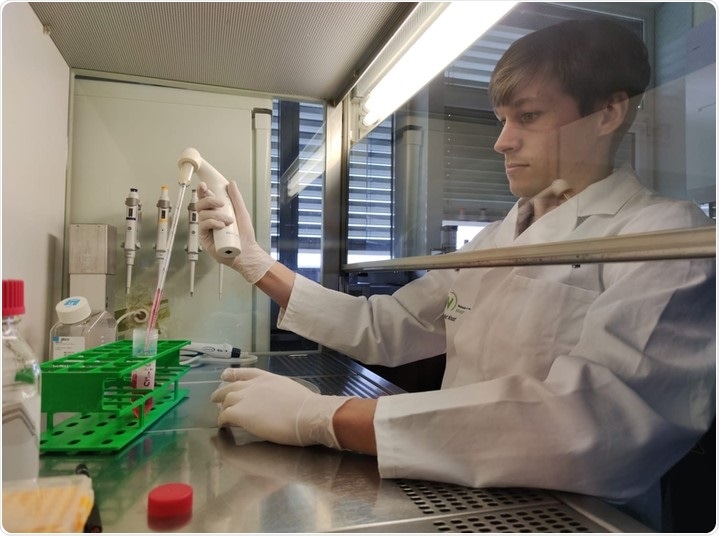The immune system responds immediately when a virus enters the cell, producing interferon—the signaling protein. This protein inhibits various steps in the process of virus replication by activating hundreds of highly dedicated defense mechanisms in the surrounding cells.

Volker Kinast examines samples in the laboratory. Image Credit: © Luise Meister.
These interferon-induced genes form the backbone of the inherent immune system, yet the mechanisms of action of only a few are clearly understood.
The interferon-induced gene called C19orf66 plays a vital role in safeguarding against hepatitis C viruses. At Ruhr-University Bochum (RUB), a team of researchers led by Professor Eike Steinmann from the Department for Molecular and Medical Virology recently analyzed the mechanism of action of C19orf66.
The findings reveal that C19orf66 interrupts the formation of the viral replication machinery. The study was published in the Journal of Hepatology on April 12th, 2020.
Hepatitis C patients produce more of the gene than healthy individuals
According to Volker Kinast, a Ph.D. student, “In order to find out whether the gene is increasingly activated in samples from hepatitis C patients, we first examined liver tissue samples from infected and healthy people.”
The investigation revealed that the production of C19orf66 is high in hepatitis C patients.
In the next step, we checked whether the gene has an antiviral effect against hepatitis C viruses. We conducted experiments using cells that contained a lot of C19orf66 and cells that contained only a little of it. We then observed that the hepatitis C virus replicates much more slowly in cells that contain a lot of C19orf66 than in control cells.”
Volker Kinast, PhD student, Ruhr-University Bochum
Virological and molecular biological analyses
The researchers performed more experiments with cells where the gene as turned off completely. The experiment results revealed that C19orf66 blocks hepatitis C virus replication. They performed several molecular biological and virological analyses to understand how C19orf66 inhibits the replication.
The findings demonstrate that the gene blocks the formation of the viral replication machinery. The hepatitis C virus can control the liver cells such that membrane vesicles start accumulating within the cell.
These membrane vesicles are used by the virus as a scaffold to replicate successfully. C19orf66 inhibits and modifies the scaffold structure, thereby blocking the replication of the virus.
Many people are not aware that they are infected
Almost 71 million people suffer from chronic hepatitis C infection, and a major portion of them are not aware of it. Over time, the virus damages the liver, which leads to severe liver disease that usually necessitates liver transplantation.
Source:
Journal reference:
Kinast, V., et al. (2020) C19orf66 is an interferon-induced inhibitor of HCV replication that restricts formation of the viral replication organelle. Journal of Hepatology. doi.org/10.1016/j.jhep.2020.03.047.